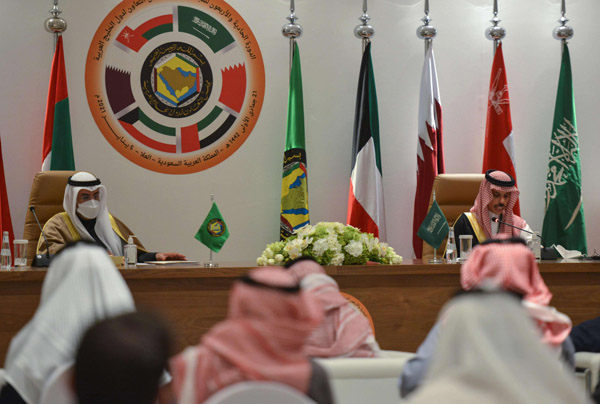
Fearing a secret agreement that may include reducing their presence in Qatar, the Muslim Brotherhood have launched a smear campaign against boycotting countries.
Turkey and Iran are racing to reap the dividends of what they consider a Qatari “victory” over Saudi Arabia and the boycotting countries after the latest Gulf Cooperation Council (GCC) summit, which ended without requiring Doha to curtail its ties with Ankara and Tehran, analysts say.
Doha’s ties with Ankara and Tehran were among the main reasons for the row that led the Arab quartet’s boycott which spanned more than three years.
The Turks and Iranians believe that Doha’s still open window will allow them to contnue pushing for the expansion of their influence in the region. This window will preserve their chances of infiltrating the Gulf and preventing a unified position of the GCC countries against Iranian threats on the one hand, and against Turkish encroachment on the other hand.
Iranian Foreign Minister Mohammad Javad Zarif praised what he called Qatari “resistance,” which he hinted could be relied upon to influence the region, referring to the sidelining of the Saudi position that seeks to build a regional balance with Iran on the security, military and diplomatic levels.
“We congratulate Qatar for its success in its courageous resistance in the face of pressure and blackmail,” Zarif said on his Twitter account.
“Our Arab neighbours know that Iran is neither an enemy nor a threat,” he added.
“Stop blaming others, especially when that renegade leaves power (referring to US President Donald Trump),” he said, adding “it is time to accept our vision of forming a strong region.”
Analysts say that Tehran is betting on Doha to play a major role in breaking the alliances that Saudi Arabia seeks to build in the Arab-Islamic world and in connection with the Americans in order to encircle Iran and prevent it from increasing tension in the region.
These analysts say that Iran’s strategy is based on fueling tension in the region to persuade Saudi Arabia and the United States that there is a door in Doha to deal with Tehran much like the door Qatar offered in hosting a dialogue between Washington and the Taliban, or in its relationship with other militant Islamic groups, including pro-Iran factions.
Analysts have doubts about Qatar’s commitment to changing its relationship with Iran in response to Saudi Arabia’s demands. They see Doha continuing to bet on Tehran as a pressure card against any push to demand that it implement the conditions enunciated in 2017.
While Iran is investing in reconciliation in order to secure a foothold that disrupts efforts to isolate it, Turkey views the results of the Al-Ula summit as a gateway to a strong return to the Gulf, especially through investment and tourism, as if reconciliation is supposed to atone for Ankara’s conspiring against the Saudis and not for Doha’s mistakes.
The Turkish foreign ministry welcomed the “Gulf reconciliation” agreement. It said that “the display of a common will to resolve the Gulf conflict and announcement of the re-establishment of diplomatic relations with Qatar are a source of satisfaction.”
It added “With the re-establishment of trust between the Gulf states, Turkey is sparing no efforts to improve our institutional cooperation with the Gulf Cooperation Council, with which we are a strategic partner.”
The Turks believe that Qatar’s “victory” in leaving the Al-Ula summit without any clear commitments is a victory for them, as they are Doha’s main ally in the boycott crisis militarily, economically and diplomatically. They believe this outcome calls for sharing in the dividends of this reconciliation.
The Turks are betting on the Saudi leadership’s willingness to forgive and forget, as it deals with reconciliation as a Gulf decision aimed at meeting regional and international challenges.
They believe that Saudi Arabia’s lenient stance will lead to it forgetting the many Turkish abuses that accompanied the case of Saudi journalist Jamal Khashoggi, stopping a popular boycott campaign in the kingdom against Turkish goods and opening the door for to public and private Saudi investment in Turkey in order to save Ankara’s dilapidated economy due to imprudent political decisions.
But analysts note that Riyadh, which is being tolerant towards Doha and wants to stem the dispute over Doha’s regional activity, has not shown any sign of openness or rapprochement towards Ankara since the phone call between Saudi King Salman bin Abdulaziz Al Saud and Turkish President Recep Tayyip Erdogan on the eve of the G20 summit.
Also, remarks by Crown Prince Mohammed bin Salman bin Abdulaziz on Tuesday at the Al-Ula summit did not refer to Turkey in any way, which means that reconciliation is an intra-Gulf issue and the kingdom does not intend to reconcile with Qatar’s allies such as Turkey, Iran or the Muslim Brotherhood.
Due to the ambiguity surrounding the reconciliation drive and the lack of clarity about who could benefit, supporters of the Muslim Brotherhood on social media have launched a campaign to smear the boycotting countries and belittle the reconciliation effort as a free response to Qatar’s pressure.
Analysts believe that the Brotherhood’s campaign against the boycotting countries shows their fear of a secret agreement that may include reducing their presence in Qatar, or that Doha might give them up in exchange for the boycotting countries’ silence about other priority issues.
They point out that the Islamist groups that used to work for Qatar are in a state of shock because reconciliation automatically means the end of the functional role they play in smearing the four boycotting countries, a role that would have brought them political favour, financial support and freedom of movement at home and abroad.
These advantages have become threatened, especially since Qatari officials have so far kept the contents of the Al-Ula meetings secret, including pledges they made related to the provision of “strengthening cooperation in combating terrorist entities, currents and organisations.”
 Eurasia Press & News
Eurasia Press & News


